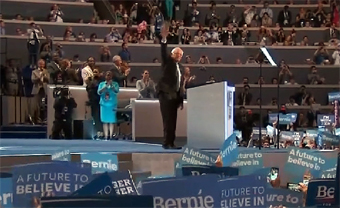
Images courtesy of C-span
Bernie Sanders, Michelle Obama, Highlight a Convention Beset by
Heckles and Boos
| published July 26, 2016 |
By R. Alan Clanton, Thursday Review editor
A Democratic Party hoping to draw a sharp distinction with its Republican rivals by conducting a trouble-free convention found itself contending with demonstrations, outbursts, and catcalls in meetings and convention sessions on its first day of activities in Philadelphia this week.
A convention marked by important speeches by First Lady Michelle Obama—who delivered a powerful and sharp political rebuttal to GOP nominee Donald Trump, without ever mentioning him by name—and a rousing speech by Vermont Senator Bernie Sanders, in which he called for part unity, became the key highlights of Monday night’s proceedings.
But the wide wake now left by the forced resignation of DNC chairperson Debbie Wasserman-Schultz has left Democrats uneasy and unsettled at the start of a week intended to be an error-free coronation of presumptive nominee Hillary Rodham Clinton, now only days away from becoming the first woman ever chosen by a major American party to run for President.
Despite wide enthusiastic applause and cheers for the speeches by Michelle Obama and Sanders, as well as impassioned addresses by Massachusetts Senator Elizabeth Warren and New Jersey Senator Cory Booker, there were frequent disruptions on the floor, as well as recurring angry shouts from some delegations frustrated by what they now see as a DNC which worked diligently—at least according the content found in thousands of hacked emails—to ensure Clinton become the nominee and to suppress support for Clinton rivals, Bernie Sanders and former Maryland Governor Martin O’Malley.
Speeches by Booker and Warren were each marred by noisy demonstrations, especially from the large delegations from Wisconsin, Iowa, Washington, Hawaii, Wyoming and Indiana—all states which Sanders won by either modest or wide margins. Sanders’ delegates from California and New Jersey were also vocal, many shouting loud chants of “we trusted you” or “you sold out” during several key speeches. Warren was heckled especially boisterously for her insistence that the party close ranks behind Clinton, a call which fell on the frustrated ears of Sanders’ legion of followers in the arena, many of them angry about the unfolding scandal now rocking the DNC.
Many of Sanders’ most ardent supporters were telling reporters that they sensed all along throughout the long debate cycle and throughout the early primaries and caucuses that the DNC—which has a chartered mandate of strict neutrality-was in fact attempting to forcibly tip the scales measurably in favor of Clinton. Thousands of emails recently released by Wiki Leaks seems to show a pattern of conversation in which top DNC officials, including Wasserman-Schultz, dismiss or disregard the concerns of Clinton’s rivals, notably Sanders, O’Malley, and former Virginia Senator James Webb.
In some emails, Wasserman-Schultz indicates that the outcome has been preordained and that Clinton will become the nominee no matter what the actions of her rivals. In one email, Wasserman-Schultz responds to questions about balance in debates by stating “Bernie Sanders will not be elected President.” Other emails show Wasserman-Schultz feeding a spin machine crafted to minimize Sanders’ authenticity, both as a Democrat and as a Jew, questioning the depth and fidelity of his religious convictions, implying that he “is an atheist,” and even suggesting that the recipient of the email “run with that line” of attack.
The email imbroglio reignited the fires of thousands of pro-Bernie delegates and thousands more protesters outside the convention hall in Philadelphia. And, despite the best efforts of the DNC officials to maintain convention decorum and a peaceful, unified front—something which could stand in stark contrast to the often contentious and bitter Republican convention held last week in Cleveland—the arena was frequently interrupted by noisy protests and demonstrably loud heckles.
Heightening the sense that many of Sanders’ most loyal supporters feel frustrated and betrayed by an official Party process which many have called rigged, Sanders’ sweeping, impassioned speech was interrupted scores of times by thunderous applause. Television cameras panning the room often moved-in on close-up images of delegates openly weeping or wiping away tears as Sanders spoke from the podium and there was visible anger in the faces of still other Sanders’ delegates. When the Vermont Senator first walked onto to stage, he was forced to wait a full five minutes before the ovation and the cheering had died down, and—frustrated himself that he was unable to begin his address—he finally he began speaking even as the roar continued.
Warren’s speech too was interrupted frequently, but more often than not by angry protests from several bitter contingents on the floor. After each speech, network news anchors and analysts would often begin their remarks and commentary by noting the severity of distractions that had occurred during the previous set of remarks.

Sanders himself was both cheered and booed when he made a specific call for party unity behind Clinton, telling the crowd that only a unified Democratic Party could expect to beat Donald Trump in November. Signs printed and distributed by the DNC—most of them adorned with pro-Clinton messages, colors and symbols—found themselves the target of angry delegates who used Sharpies and markers to alter the messages or scrawl opposing messages, an ad hoc rebellion which in turn angered DNC officials hoping to create a unified image for the television cameras and the millions watching the convention.
The DNC’s email scandal has, in effect, torn open a wound not fully healed. Clinton and Sanders fought intensely for the nomination, with Sanders winning far more states and raising far more money than was ever expected by the political experts or by the Clinton campaign, which had hoped to secure the nomination early in the primary and caucus season. Candidates O’Malley, Sanders and Webb had at various times told reporters that the DNC, under the leadership of Wasserman-Schultz, was acting as a public relations agency for Clinton and her top campaign staff.
O’Malley—long a challenger of the fidelity of Hillary Clinton’s progressive record—had on several public occasions sought to challenge Wasserman-Schultz’s stewardship over the process, and has suggested as far back as early 2015 that the DNC chairperson was too much of an ardent supporter of Clinton to be trusted to fairly manage the debate and nomination process in an unbiased way. The release by Wiki Leaks of emails which seem to show Wasserman-Schultz acting behind-the-scenes facilitator for Clinton, while simultaneously seeking to minimize the options for Clinton’s rivals, confirms—for many—their worst fears all along, that the DNC was in effect a pro-Clinton shop from the start.
Still, the most anticipated of Monday night’s speeches arrived and was delivered. Sanders delivered a powerful, emotional speech, and asked that Democrats unite to enthusiastically support Clinton.
“Any objective observer would conclude—based on her ideas and her leadership—Hillary Clinton must become the next President of the United States.” The remarks prompted a roar or approval even as it spurred audible jeers and boos from others. On Tuesday, Sanders again attempted to quell the possibility of a fractured party, speaking to the California delegation directly, asking them to rally around Clinton and trying to shout over the sound of boos from the delegates. Sanders called out that it was “easy to boo,” but that it will be much more difficult to explain to children how Donald Trump became President.
Still, by Tuesday, some political observers were noting that the convention may have begun to reach its stride. Roll call voting will eventually put the vote for Clinton over-the-top, making her the first woman ever to be nominated by a major political party in U.S. history.
The question for Democrats: can the bitterness of many of Sanders’ supporters be overcome by the mutual desire of liberals and progressives to win in November, or will some of the divisions—fractures which mirror some in the GOP—cause many voters to stay home or cast their votes for third party candidates instead.
Related Thursday Review articles:
Wasserman-Schultz Resigns as DNC Hairwoman ; Keith H. Roberts; Thursday Review; July 25, 2016.
Tim Kaine Tests Message With Clinton; Keith H. Roberts; Thursday Review; July 24, 2016.
